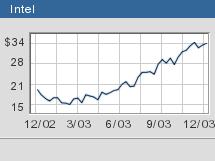NEW YORK (CNN/Money) -
Intel Corp. Thursday raised the low end of its revenue forecast for the fourth quarter, citing strong demand for a broad array of its chips, but sparked some alarm among investors by announcing a $600 million charge and not raising the high end of the revenue projection.
Intel stock, which rose during regular trading, sank about 3 percent in Instinet before-hours trading Friday to $32.35, according to Reuters.
The world's largest maker of semiconductors said it expected sales of between $8.5 billion and $8.7 billion in the quarter ending Dec. 31. Wall Street analysts, on average, expected revenue of $8.53 billion, according to earnings tracker First Call.

In October, Intel said it expected fourth-quarter sales of between $8.1 billion and $8.7 billion, compared with $7.16 billion a year ago.
Santa Clara, Calif.-based Intel also said that gross margins, a key measure of profitability, should be about 62 percent in the fourth quarter, "plus or minus a point." In October, Intel forecast gross margins of roughly 60 percent, compared with 58.2 percent in the third quarter.
"This is a very good report, as expected," said Eric Rothdeutsch, an analyst with Friedman Billings Ramsey. "It's clearly a very strong quarter, and they're executing very well to get gross margins to the high end of their expected range."
| Related stories
|

|
|
|
|
But Intel also said it expected to record a charge of about $600 million in the quarter related to cutting back long-term growth expectations for its wireless business. It said the charge could shave 6 cents per share from its earnings in the quarter.
Nearly all of the write-down is due to poorer-than-expected sales in the wireless chipset business, partially as a result of products being late to market, Andy Bryant, chief financial officer, said in a conference call with analysts.
The wireless group "underperformed fairly substantially this year," he added.
"I think the impairment charge seems to be a big negative surprise to investors," said Krishna Shankar, an analyst with JMP Securities, who nonetheless was keeping his "outperform" rating on Intel shares, which have more than doubled in the past year.
"Intel will be a key beneficiary of any kind of recovery in information technology [IT] spending in 2004 and 2005," Shankar said.
Intel does not give earnings-per-share guidance. Analysts are expecting Intel to report earnings of 29 cents a share for the fourth quarter.
Good quarter, good year for chips
Intel typically gives so-called mid-quarter updates at the beginning of the last month of the quarter, and several analysts this week had already raised their estimates for Intel's quarterly revenue.
In its brief press release, the company only cited "solid seasonal growth" in its microprocessor business, which makes up about 80 percent of its revenue, and as-expected growth in demand for communications chips.
Intel's revenue guidance echoed bullish forecasts from others in the chip sector recently. On Thursday, National Semiconductor (NSM: Research, Estimates) forecast stronger-than-expected revenue in the current quarter. Wednesday evening, chip-equipment maker KLA Tencor (KLAC: Research, Estimates) dramatically boosted its sales outlook for the current quarter.
The entire year, in fact, has been a very good one for the chip sector. Intel's shares have risen a healthy 113 percent, while the Philadelphia Stock Exchange's semiconductor index has gained more than 90 percent since bottoming out in early February.
Holiday shopping usually makes the fourth quarter especially good for the makers of computers and their parts, and so far it seems the current holiday season will be no different. PC makers Dell (DELL: Research, Estimates) and Hewlett-Packard (HPQ: Research, Estimates) both reported strong sales during the weekend after Thanksgiving.
Perhaps more important from a macroeconomic perspective, however, is the broader outlook for business spending. So far, Intel and other chipmakers have been reluctant to pop the champagne corks, despite government reports of higher business investment in technology.

Krishna Shankar owns Intel stock, but his firm, JMP Securities, has no relationship with the company. Eric Rothdeutsch does not own Intel stock, and Friedman Billings Ramsey has no relationship with Intel.
|

